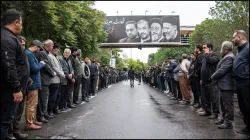Iran: Funeral services for late President Raisi begin, thousands mourn hardline leader
Thousands of people walked through the Iranian city of Tabriz on Tuesday to honour Raisi, his foreign minister Hossein Amir-Abdollahian and others killed in the helicopter. Raisi, 63, was a hardline leader tipped to become Iran's next Supreme Leader after Ayatollah Ali Khamenei.

Tehran: Thousands of mourners dressed in black gathered on Tuesday as the first of several funeral ceremonies and processions began for late Iranian President Ebrahim Raisi, who was killed in a helicopter crash along with Foreign Minister Hossein Amir-Abdollahian. The government-led ceremonies are aimed towards not only honouring the dead but also projecting strength in a chaotic Middle East as Raisi's death comes at a difficult time for Iran.
VIDEO: Iran president's death met by muted mourning
Thousands of people walked through the northwestern Iranian city of Tabriz on Tuesday to honour Raisi, Amir-Abdollahian and other members of his entourage, DW reported. Iran's Supreme leader Ayatollah Ali Khamenei, who has ultimate authority in Iran, has declared five days of national mourning for the late president.
Raisi's body will be taken from Tabriz to the Shiite pilgrimage city of Qom on Tuesday before being moved to the capital, Tehran. Khamenei is expected to hold prayers at a farewell ceremony in Tehran on Tuesday night, with major processions planned to begin on Wednesday morning. Raisi's body will then be taken to Southern Khorasan province on Thursday morning before arriving in his hometown of Mashhad, where he will be laid to rest.
Divided response among Iranians on Raisi's death
Thousands in black slowly walked beside the coffins, some throwing flowers up to them as an emcee wept through a loudspeaker for men he described as martyrs. For Iran's Shiite theocracy, mass demonstrations have been crucial since millions thronged the streets of Tehran to welcome Grand Ayatollah Ruhollah Khomeini in 1979 during the Islamic Revolution. An estimated 1 million turned out in 2020 for processions for the late Revolutionary Guard Gen. Qassem Soleimani, who was slain in a US drone strike in Baghdad.
However, Raisi's death was met by a muted atmosphere that revealed little of the spectacular public grief that has accompanied the deaths of other senior figures in the Islamic Republic's 45-year history. Most shops remained open and the authorities made little effort to interrupt ordinary life as government loyalists packed into mosques to pray for the deceased President and foreign minister.
More than a year after Raisi's hardline government cracked down violently to end the biggest anti-establishment demonstrations since the 1979 revolution, opponents even posted furtive videos online of people passing out sweets to celebrate his death. Prosecutors already have warned people over showing any public signs of celebrating his death and a heavy security force presence has been seen on the streets of Tehran since the crash.
Raisi was tipped to become Iran's next Supreme Leader
Raisi, 63, had been discussed as a possible successor for Iran's supreme leader, the 85-year-old Ayatollah Ali Khamenei. His death now throws that selection into question, particularly as there is no heir-apparent cleric for the presidency ahead of the planned June 28 elections. Supreme Leader Khamenei, who holds ultimate power with a final say on foreign policy and Iran's nuclear programme, said First Vice President Mohammad Mokhber, would take over as interim president.
However, his international standing was dented due to the monthslong security crackdown that followed the anti-Hijab demonstrations following the death of Mahsa Amini in 2022, killing more than 500 people and saw over 22,000 detained. In March, a United Nations investigative panel found that Iran was responsible for the “physical violence” that led to Amini's death.
Dubbed "The Butcher of Tehran" due to his involvement in the mass executions of thousands in 1988, he steered the country alongside Ali Khamenei, overseeing the enrichment of uranium to near weapons-grade levels and orchestrating significant drone and missile raids on Israel. The unexpected passing of Raisi, alongside Iran's foreign minister and other officials, docks amidst Iran's grappling with internal discord and navigating its relationships on the global stage.
What happens now?
According to experts, Raisi's death could result in internal infighting in the Iranian regime due to the possibility of the supreme leader's son succeeding him. Critics may view this as a move toward a hereditary monarchy, contrary to the principles of the Islamic Republic. Such a transition could spark anger among Iranians already disillusioned with clerical rule, as well as among regime supporters who might see it as un-Islamic.
Iran's economy continues to suffer from Western sanctions linked to its nuclear program, and strict enforcement of Islamic rule, particularly under Raisi, has alienated many, including women and young people. Recent years have seen significant protests, notably after the death of Mahsa Amini in 2022, which led to a violent crackdown. Raisi's death could complicate the succession process and potentially trigger further unrest in Iran.
(with inputs from agencies)
ALSO READ | 'It wasn't us': Israeli official on country's rumoured involvement in Iranian President Raisi's death